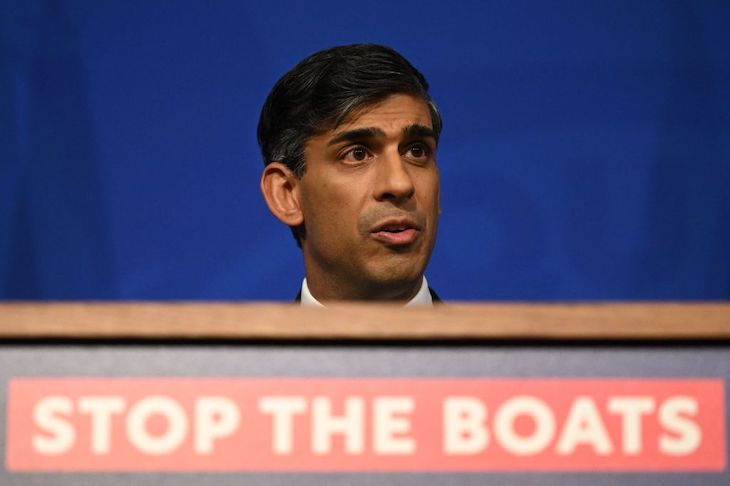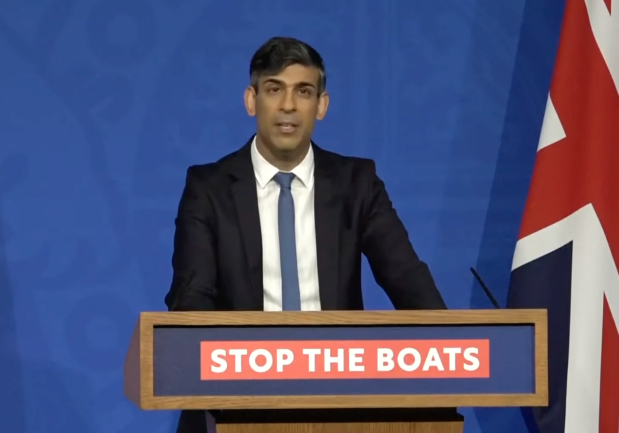Rishi Sunak has promised to respond to the Supreme Court’s judgment that the Rwanda policy is unlawful by agreeing a new treaty with Rwanda and introducing fast-track legislation to parliament. This has been widely ridiculed, as if the proposal were for parliament simply to ignore findings of fact made by the Supreme Court or, worse, for parliament to authorise refugees being sent back to their persecutors. It is extremely unlikely that this is what will be proposed. Much more reasonable proposals are likely – and should be given a fair hearing.
The Supreme Court was able to block the Rwanda plan because the government attempted to implement it without securing express parliamentary authorisation. Ministers gambled on being able to persuade the courts that the plan was lawful because Rwanda was a safe country. Outsourcing asylum claims to Rwandan officials always involved legal risk, which is why Policy Exchange has long argued for offshoring rather than outsourcing. It would be odd for Parliament simply to enact legislation saying that, despite the Supreme Court’s judgment, Rwanda is to be treated as a safe country for the purposes of immigration and asylum law. The question having been put to the Court, parliamentarians need to respect its finding on the evidence it heard.
Legislating in this way would not be ignoring or failing to respect the judgment
Last week’s judgment leaves it open to the Government to change tack and to adopt offshoring, which would involve removing asylum-seekers from the UK, whether to Rwanda or, better, to a British overseas territory, where their claims would be processed by British officials. Genuine refugees would then be settled in a safe third country. Settlement of those refugees in Rwanda would be lawful, provided there was then no real risk that they would be expelled from Rwanda to an unsafe country. The Supreme Court found the Rwanda plan was unlawful, not because refugees would be in danger in that country itself, but because it thought the Rwandan asylum system was unreliable. This meant there was a real risk they would wrongly be sent back to their country of origin.
A new treaty will directly address this risk if, as seems likely, Rwanda undertakes not to remove any asylum-seeker sent from the UK – even one whose asylum claim fails. If such a treaty is agreed, parliament should enact legislation that enables removals of asylum-seekers to Rwanda to go ahead. Such legislation would protect the policy from the threat of being held up by legal challenges.
The legislation would have been enacted on the premise that the new treaty addresses the risk that the Supreme Court’s judgment identified. It would not assert that the Court’s factual findings were wrong, but rather that they had been overtaken by new facts. If parliament agrees with the government that Rwanda is likely to honour a treaty that categorically rules out onward removals, then it is free to legislate to enable removals to proceed. It is a mistake to think that legislation needs to be approved by the courts before it is put into effect.
When the Illegal Migration Act 2023 is brought into force, the Home Secretary will be under a duty to attempt to remove asylum-seekers from the UK. The Upper Tribunal, which is the equivalent to the High Court, will be able to grant “suspensive relief” when removal gives rise to a risk of serious harm, which includes the risk of onward removal to an unsafe country. Asylum-seekers will be able to continue Human Rights Act challenges from outside the UK, which might result in a court ordering their return, but these challenges will not provide a ground to suspend removal from the UK in the first place.
If a new treaty is agreed, parliament should amend the Illegal Migration Act to rule out suspensive relief in relation to removals to Rwanda, except for when an asylum-seeker faces a real risk of being persecuted by the Government of Rwanda. (The Act should also be amended to provide that the Human Rights Act does not apply in relation to removal from the UK, such that asylum-seekers cannot argue that their removal from the UK breaches Convention rights.) This would prevent separate challenges to each removal, with asylum-seekers deploying the Supreme Court’s recent judgment in an attempt to suspend their removal. Legislating in this way would not be ignoring or failing to respect the judgment. It would be legislating to make clear that the judgment is no longer relevant because parliament is content that the risk has now been addressed.
The legislation should also impose a duty on the Secretary of State to report back to parliament every three months on the operation of the scheme. This would reinforce political accountability for assessing the reliability and good faith of another state, something that in most other contexts is regarded as part of the conduct of foreign relations. The government would of course need to give an undertaking to suspend removals if a real risk of Rwandan non-compliance with the treaty were to emerge.
The point of legislation would be to avoid the new Rwandan plan being frustrated in our own courts. This would not prevent challenges in the European Court of Human Rights: asylum-seekers would be able to apply to this court to seek interim relief to block their removal from the UK and to seek a substantive ruling that Rwanda is unsafe, that asylum claims must be heard in the UK, or that each asylum-seeker is entitled to a separate judicial hearing about the merits of his removal.
If the Strasbourg Court in the end denounces the plan, then the UK will have to decide whether to comply with the judgment, to refuse in substance to comply, or to leave the Convention. In the meantime, parliament should not only legislate to expressly authorise removals to Rwanda, if it is content with the terms of a new treaty. It should also legislate to set aside section 4 of the Human Rights Act, which would otherwise enable further litigation, with the courts being invited to denounce the Illegal Migration Act and any new legislation as incompatible with Convention rights. Instead, parliament should take responsibility.
Got something to add? Join the discussion and comment below.
Get 10 issues for just $10
Subscribe to The Spectator Australia today for the next 10 magazine issues, plus full online access, for just $10.




















Comments
Don't miss out
Join the conversation with other Spectator Australia readers. Subscribe to leave a comment.
SUBSCRIBEAlready a subscriber? Log in